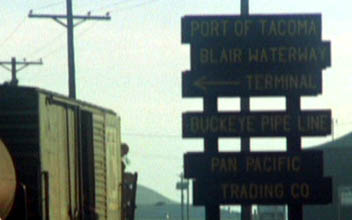|
Scoop's comment's in white: SPOILERS: This is an oddly constructed movie, basically consisting of two completely different movies featuring the same characters. In the first half, it's a gritty, realistic drama about three kids who gave up dead-end jobs in L.A. to pursue their dream of an independent new life in Alaska. |
|
|
Once there, they found that they had miscalculated
the opportunities and the risks attendant in such a venture. In fact, as you can see by the sign to the right, they had even miscalculated the location of Alaska, finding it in the Port of Tacoma, Washington. (A close-up of the sign? C'mon, director, that's not even tryin'!!) Anyway, they found themselves even more down-and-out in "Alaska" than they had been in California. They were homeless, down to their last pennies, and eating dog food. |
 |
|
So it's a gritty slice-of-life drama about the dark side of the American Dream, right? Steinbeck for the Seventies? It might have been, except that realistic part of the movie came to an abrupt halt, and the entire script veered off into a fantasy world. Down on their luck and desperate, they decided to hold up a payroll office, took an employee for ransom, and demanded hundreds of thousands from the company they robbed. Soon they had become a modern Bonnie and Clyde and Clyde, darlings of all the television stations, running from an armada of cops, engaged in gunfights with good guys and bad, and speeding through the wilderness in wild car chases. In their spare time, while on the lam in the wilderness and hungry, they also managed to kill a bear at a long distance with a tiny handgun. After the highs and lows of that chase, they appeared to be just as down and out as before the robbery. On what appeared to be their final night of life, two of them were sleeping in a inoperable car on a freezing Alaska night, while the third went on foot to try to get help. So now it's a heartbreaking, gritty slice-of-life crime drama about loveable crooks getting their eventual comeuppance? Well, not exactly. Dawn broke on the two in the car. The boy was dead. The girl was shrieking for help. Shrieking? Who could hear her in the wilderness? The other guy, as it turns out. He arrived in a van, from parts unknown, apparently having managed to win a vehicle from a masked wrestler in an Alaskan Cage Match. The script never did explain how he could have walked off into the Alaskan wilderness on foot on a freezing night, without cash, and managed to return the next day with a van. But the miracles did not end there. He went over to his dead friend, slapped him a couple of dozen times, said "live, damn you", and sure enough, the friend turned out to be not dead, but merely stunned, much like the Norwegian Blue in the Polly sketch. So the three of them hopped in their new vehicle and drove off to their new adventure. One of them said "Hawaii?", and the one who had recently frozen to death and been resurrected said, "Sure, I could use the sun!" The End. Odd stuff, eh? It isn't as bad as you might expect from the 3.9 rating at IMDb, but it is certainly a rambling, unfocused and ultimately pointless story which really couldn't decide whether it was a comedy, a crime caper, a gritty drama, a character study, or a buddy picture. It might have worked as a character study if the actors had been proficient enough to win the empathy of the audience, but they weren't, so it didn't. The film is probably best remembered, if it is remembered at all, for three things:
|
|
